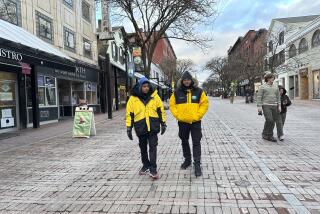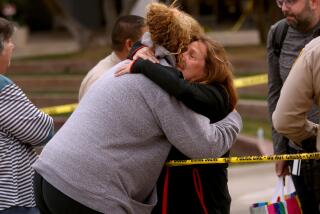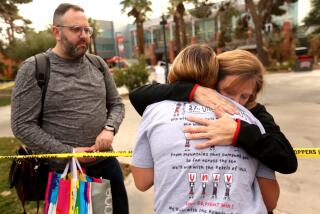From the archives: Canadian Killer Sulked When Things Went Wrong
MONTREAL -- Police on Thursday identified the gunman who killed 14 women, wounded 13 other people and killed himself Wednesday as Marc Lepine, an unemployed 25-year-old who “had few friends of the female gender” and who once aspired to study at the engineering school where he went on his murderous spree.
The police, who are still interviewing Lepine’s relatives and a male roommate in an attempt to learn why the gunman selected only female victims, also said the young man was obsessed with war movies.
There were other signs of unhappiness in the young man’s life--feelings the killer himself wrote about in a three-page suicide note that police found in his pocket after the bloody rampage. Police say his father, whom they believe to be Algerian, left his family when son Marc was 7 years old.
Lepine went on to complete several years of college. He took night courses, and police said he wanted people to think that he loved to read. But “we know he had some failures in his academic record in school,” the police said.
They also said that in his relationships with women, Lepine would “just cease the conversation” and “go back in his room” when things “didn’t go his way”--an observation that sheds light on the misogynist nature of the crime.
On Wednesday, the lone gunman walked into Ecole Polytechnique of the University of Montreal, and went on what witnesses have described as an anti-feminist rampage. He fired shots into the ceiling and at students, then burst into a classroom during an oral presentation and ordered the male students and teacher to leave. One student said he heard the gunman say, “I want women.”
According to survivors, the man then shouted an obscenity, called the women remaining in the classroom “feminists” in French and opened fire on them, killing six. He then left the classroom and roamed the corridors, pausing to fire and reload as he went. Eight women were fatally shot elsewhere in the building. One policeman arriving at the scene discovered his own daughter among the dead.
One of the injured remained in critical condition Thursday. The rest were said to be stable.
It was the worst mass shooting ever in Canada--a country that tends to look upon senseless, violent crime as an American phenomenon--and the third-worst in North America.
Police said that Lepine was born Gamil Gharbi but adopted his mother’s name in 1982. They declined to speculate on the reason for the switch. They said he was a non-drinking, non-smoker who always wore a baseball cap to conceal his unruly curly hair.
They said they did not yet know whether he had ever applied for admission to the Ecole Polytechnique, but had learned that he took chemistry and other courses at night, in hopes of being accepted there.
In his suicide note, Lepine wrote that he was going to have to die on Dec. 6, then blamed his problems on “feminists who had always ruined his life,” according to Jacques Duchesneau, head of the Montreal police organized crime unit. The remark seemed to indicate that Lepine felt that women were receiving advantages he never had.
His letter, which has not yet been released in full, also included a list of women in Montreal. Police declined to reveal their names, or to speculate on why the killer had mentioned them. Duchesneau said the police withheld the letter “so that we don’t give bad ideas to other people.”
Duchesneau said Lepine also claimed in his suicide note to have “political reasons” for committing the massacre but didn’t explain what these were. The officer said the letter further complained of a life of unhappiness, especially during Lepine’s final seven years.
Lepine also wrote that he had been rejected by the armed forces as “anti-social,” Duchesneau said.
And Lepine mentioned Cpl. Denis Lortie, a supply clerk at a Canadian Forces base who in 1984 stole two sub-machine guns and a pistol and went on a shooting spree in the Quebec National Assembly in Quebec City, killing three government employees and wounding 13 other people.
Police were able to learn the gunman’s identity by tracing the purchase and registration of the weapon he used--.223-caliber Sturm Ruger semiautomatic hunting rifle. They said Lepine had bought it Nov. 21, and had registered it properly. They said they didn’t know when he had begun planning his crime.
“He was always known to be gentle and courteous with women until the relationship didn’t go his way,” said Duchesneau. “He was known to go into his room and stop the conversation right there. . . . He didn’t have any girlfriends.”
On the university campus Thursday, students still seemed stunned by what had happened.
“We were doing our oral presentation,” said engineering student Roger Thiffeauld, who was in the room where Lepine killed four women just before shooting himself. “The girl in my team had just finished her presentation, and I did mine. Just when we were switching transparencies, the guy came in.”
Thiffeauld said he didn’t hear Lepine make any anti-women remarks, but added that the first person shot was his female teammate in the presentation. All the students dove to the floor, he said, and then he could hear Lepine walking about the room on the tops of the desks, picking out students here and there.
At the time, Thiffeauld said, he didn’t realize it, but Lepine was walking about finding the women where they lay and shooting them. He says that at one point during the ordeal Lepine shot the woman lying on the floor just two or three feet from him. Thiffeauld said she lay moaning and eventually bled to death.
Asked to describe the killer’s attitude as he went about his gruesome work, Thiffeauld responded, “He was serious. He wasn’t excited or anything like that.”
Another engineering student Mario Cantin, pointed out that the Ecole Polytechnique had been working hard to recruit women and said he couldn’t understand why Lepine had targeted them.
“The guys at Polytechnique are quite happy that the number of women is increasing every year,” he said. “I don’t think they feel the women are stealing our jobs.”
More to Read
Sign up for Essential California
The most important California stories and recommendations in your inbox every morning.
You may occasionally receive promotional content from the Los Angeles Times.










